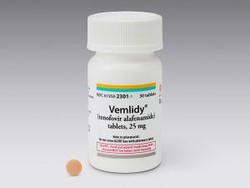Gilead Sciences Korea’s hepatitis B treatment Vemlidy (ingredient: tenofovir ala fenamide, TAF), a follow-up to Viread, continued to achieve expansion in prescriptions for the third year in 2020.
However, prescriptions of Vemlidy in 2020 were only one-third of those of Viread. This indicates that Vemlidy failed to replace Viread fully. The insufficient switching from Viread to Vemlidy is believed to have stemmed from drug regulations limiting the drug switch for certain patients.
U-BIST data showed that outpatient prescriptions of Vemlidy rose from 7.4 billion won ($6.7 million) in 2018 to 18.3 billion won in 2019 and to 26.9 billion won in 2020. The 2019 prescriptions were up 147 percent year-on-year, and the 2020 prescriptions, up 47 percent.

Vemlidy sales' growth contrasts with the decline of sales of other leading drugs such as Viread and Baraclude in the hepatitis B treatment market.
Outpatient prescriptions of Viread, the leading hepatitis B treatment, declined from 170.3 billion won in 2018 to 112.5 billion won in 2019 and to 86.5 billion won in 2020. The 2019 figure went down by 34 percent compared to 2018, and the 2020 sales, down 23 percent compared to 2019.
The sales drop is attributed to Viread's price cut, after the drug’s substance patent expired in November 2017, and the composition patent in November 2018.
Baraclude, ranking second in the market share, also had a setback in sales. Outpatient prescriptions of Baraclude kept shrinking from 80.3 billion in 2018 to 75.4 billion won in 2019, and 69.9 billion won in 2020. The annual prescriptions went down 6 percent in 2019 from 2018, and 7 percent in 2020 from 2019.
Since Viread’s patent expiration, prescriptions of tenofovir disoproxil fumarate (TDF) containing generic drugs rose for the past three years but did not significantly affect Viread prescriptions.
U-BIST data showed that TDF-containing generic drugs included Liverford, Viriva, Compacteno, Tenovir, and Tenofovil. The five medicines' combined sales skyrocketed by 1,485 percent on-year from 12.69 million won in 2018 to 201.1 million won in 2019, and by 176 percent to 556 million won in 2020.
However, the combined prescriptions of TDF generic drugs accounted for only 1 percent of Viread prescriptions in 2020.
The volume of prescriptions of Vemlidy also grew from 1.97 million tablets in 2018 to 4.86 million in 2019 and 7.15 million in 2020, up 147 percent and 47 percent on-year, respectively.
Viread's prescriptions' volume inched down during the same period, but Viread still maintained its dominance in the hepatitis B treatment market.
Viread sold 36.8 million tablets in 2018, 35.6 million in 2019, and 34.5 million in 2020, declining 3 percent year-on-year in 2019 and 2020. In contrast, outpatient sales of other hepatitis B treatments suffered a two-digit drop during the cited period.
Baraclude sold 25.7 million tablets in 2018, 24.2 million in 2019, and 22.5 million in 2020, going down 6 percent and 7 percent on-year, respectively.
Prescriptions of Vemblidy were on the rise but failed to replace the sales of Viread. Prescriptions of Vemlidy were only 31 percent of those of Viread in 2020.
Professor Ahn Sang-hoon of gastroenterology at the Severance Hospital said while prescriptions of Vemlidy increased gradually, many patients still maintained to use Viread.
“The number of new patients with hepatitis B went down, but physicians can use Vemlidy only for the first treatment and cannot switch from Viread to Vemlidy easily. We can’t just change it just like we do with diabetes or hypertension drugs,” he said.
The Korean regulator allows switching from Viread to Vemlidy only for patients who have to take osteoporosis drugs due to a low T-score less than minus 2.5 or those with estimated glomerular filtration rate (eGFR) less than 60ml/min/1.73m2.
Ahn said patients often ask him if they should change from Viread to Vemlidy because Viread affects the renal function or bone density.
However, the current regulation makes it almost impossible to do so, he said.
“In the past, we used a drug even if we had concerns for side effects. But now, even though we have a better drug, we can’t use it,” he added.
Ahn predicted that Vemlidy prescriptions would increase significantly if the regulator allows switching from Viread to Vemlidy.

